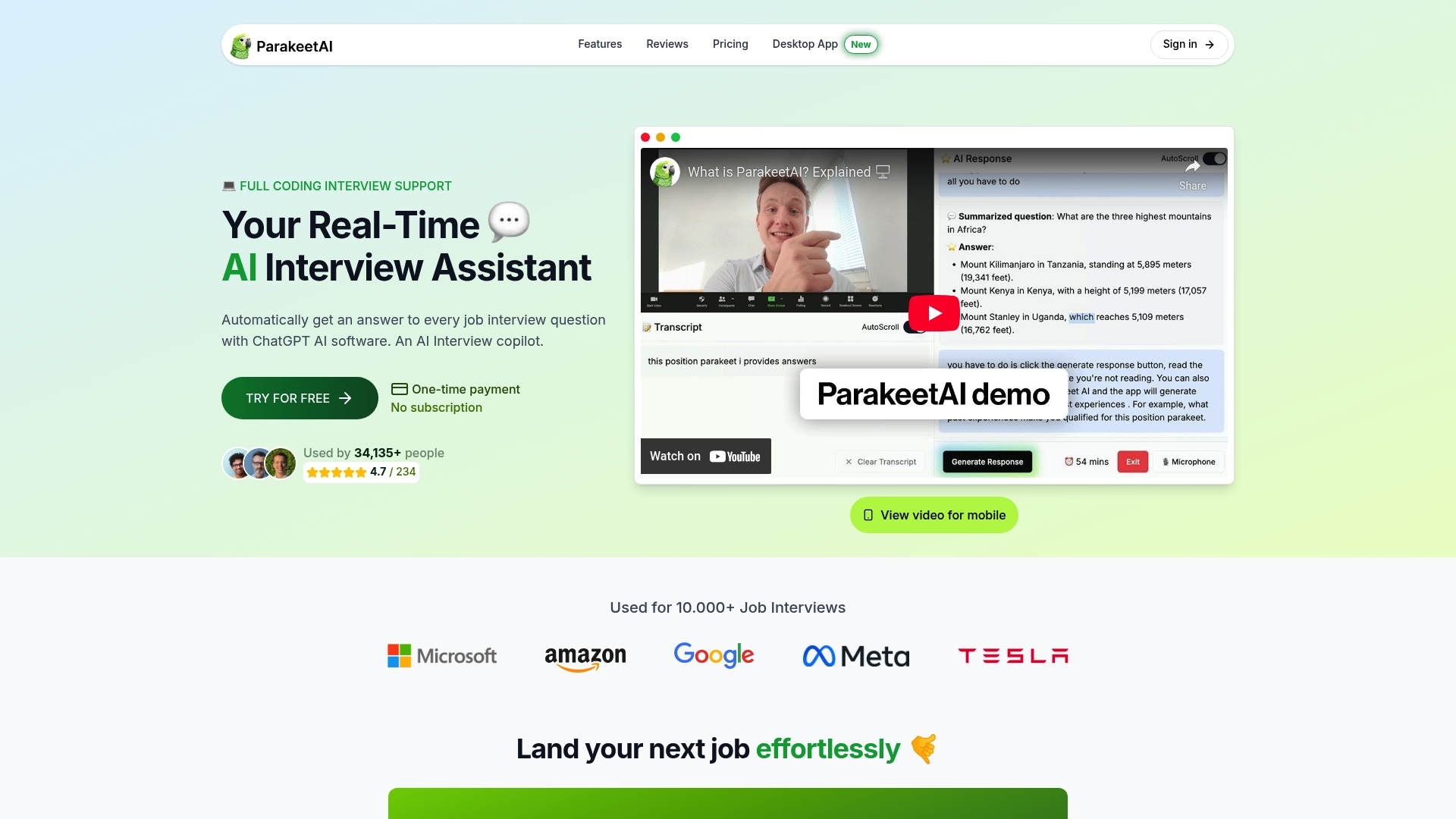Why AI Is Critical for Interviews: Complete Guide

Did you know that candidates who go through AI-conducted interviews are 12% more likely to receive job offers compared to traditional methods? Fast advances in artificial intelligence are changing how companies hire, giving both employers and job seekers new experiences that focus on speed, fairness, and accuracy. With data-driven assessments and flexible formats, AI-driven interviews are shaping the future of recruitment, raising expectations for what a modern job search should look like.
Table of Contents
- AI’s Role In Modern Interviews
- Variations Of AI Interview Methods
- How AI Improves Candidate Experience
- Bias, Fairness, And Legal Challenges
- Risks, Limitations, And Safeguards
Key Takeaways
| Point | Details |
|---|---|
| AI Enhances Recruitment Efficiency | AI improves the recruitment process by providing standardized evaluations, reducing biases, and processing large volumes of candidate data quickly. |
| Diverse AI Interview Methods | AI offers various interview formats, including asynchronous one-way, live-assisted, chatbot, and simulation assessments, to gather comprehensive candidate insights. |
| Improved Candidate Experience | AI interviews provide flexibility in scheduling and detailed performance feedback, making the hiring process more accessible and user-friendly for candidates. |
| Addressing Algorithmic Bias | To maintain fairness in AI-driven recruitment, it’s essential to implement diverse training data, regular audits, and transparent decision-making processes. |
AI’s role in modern interviews
The landscape of job interviews is transforming dramatically with artificial intelligence revolutionizing traditional recruitment processes. According to research from Business Insider, AI recruiters are demonstrating remarkable capabilities that surpass human recruiters in early-stage interviews. In a controlled experiment involving over 70,000 applicants, AI-conducted interviews produced compelling results: candidates were 12% more likely to receive job offers, 18% more likely to start work, and 17% more likely to remain employed after 30 days.
AI interviews represent a comprehensive automation of the hiring workflow, delivering dynamic and role-specific assessment techniques. These advanced systems can capture candidate responses through multiple channels—including video, audio, and chat interfaces—while applying sophisticated natural language processing (NLP) and machine learning algorithms. By analyzing content, speech patterns, behavioral signals, and response timing, AI can systematically score and rank candidates with unprecedented precision and consistency.
The key advantages of AI in modern interviews include:
- Standardized evaluation across all candidates
- Elimination of human bias in initial screening
- Faster, more efficient recruitment processes
- Ability to process large volumes of candidate data
- Objective, data-driven candidate assessment
For a deeper understanding of how AI transforms interview experiences, check out our tutorial on AI interview assistants. As recruitment technology continues evolving, AI will likely become an indispensable tool for organizations seeking to optimize their hiring strategies and identify top talent with greater accuracy.
Variations of AI interview methods
AI interview methods have rapidly evolved, offering diverse approaches to candidate assessment that go far beyond traditional recruitment techniques. According to research from Talent Tuner, these innovative methods can be categorized into several distinctive formats, each designed to extract comprehensive insights about potential candidates through advanced technological solutions.
Automated video interviews represent one of the most sophisticated AI interview techniques, where artificial intelligence analyzes both verbal and non-verbal communication cues. These interviews leverage complex algorithms to evaluate candidates’ body language, speech patterns, emotional intelligence, and communication effectiveness. By capturing nuanced details that human recruiters might miss, these systems provide a more holistic candidate evaluation.

The primary variations of AI interview methods include:
Here’s a comparison of the primary AI interview methods and their features:
| Method | Description | Key Benefits |
|---|---|---|
| Asynchronous One-Way | Candidate records responses | Flexible scheduling Reduced bias |
| Live AI-Assisted | Real-time adaptive questioning | Immediate feedback Dynamic evaluation |
| Chatbot | Interactive text-based assessments | Accessible Efficient screening |
| Simulation Assessments | Role-play decision-making scenarios | Tests problem-solving Realism |
| Hybrid Formats | Mix of various AI techniques | Comprehensive Versatile insights |
- Asynchronous one-way interviews: Candidates record responses independently
- Live AI-assisted interviews: Real-time interaction with adaptive questioning
- Chatbot interviews: Interactive text-based assessments of reasoning skills
- Simulation assessments: Role-play scenarios testing decision-making abilities
- Hybrid formats: Combining multiple assessment techniques
To gain deeper insights into how these AI interview methods transform recruitment processes, explore our article on AI interview analysis. As technology continues advancing, these AI-driven interview methods are poised to revolutionize talent acquisition, offering unprecedented precision and objectivity in candidate assessment.
How AI improves candidate experience
AI is transforming the job interview landscape by offering unprecedented improvements to the candidate experience. According to a large-scale study by Business Insider, 78% of applicants actually preferred AI interviews over traditional human-led recruitment processes, highlighting a significant shift in candidate perception and satisfaction with technological innovations.
Asynchronous AI interviews have emerged as a game-changing solution, providing candidates with remarkable flexibility and accessibility. These advanced interview formats allow job seekers to respond to interview questions on their own schedule, effectively removing geographical and time-zone constraints. By offering structured post-interview analytics—including detailed transcripts, behavioral insights, and comprehensive scoring breakdowns—AI creates a more transparent and informative experience for candidates.
Key benefits of AI in improving candidate experience include:
- Flexible interview scheduling
- Reduced geographical limitations
- More consistent and objective evaluation
- Detailed performance feedback
- Enhanced accessibility for diverse candidates
- Elimination of unconscious human bias
To understand how AI is revolutionizing the job search process, check out our article on benefits of real-time AI interviews. While some candidates report the experience as less “natural” and occasionally encounter technical challenges, the overwhelming trend suggests that AI-powered interviews are creating more equitable, efficient, and user-friendly recruitment experiences.
Bias, fairness, and legal challenges
Algorithmic bias represents one of the most significant challenges in AI-driven recruitment technologies. A systematic review reveals a complex framework for identifying and mitigating potential unfairness across multiple stages of machine learning hiring processes, highlighting the intricate balance between technological innovation and legal compliance.
The research indicates a four-stage approach to addressing bias: data generation, model training, testing, and deployment. Each stage presents unique challenges in ensuring that AI interview systems remain fair and non-discriminatory. Particularly complex are the intersections between computational fairness metrics and existing legal standards, especially in regions with robust non-discrimination regulations like the European Union.
Key considerations for addressing bias in AI interviews include:
- Diverse and representative training data
- Regular algorithmic audits
- Transparent decision-making processes
- Continuous monitoring for unintended discrimination
- Alignment with legal non-discrimination standards
- Interdisciplinary review of AI assessment methods
To explore the nuanced legal landscape of AI-driven recruitment, read our guide on understanding AI interview legal challenges. While AI holds tremendous potential for creating more objective hiring processes, ongoing vigilance and proactive bias mitigation remain critical to ensuring fair and equitable candidate assessments.
Risks, limitations, and safeguards
AI interviewing technologies, while promising, come with substantial risks that demand careful consideration. According to a comprehensive review, these systems face significant challenges including data quality issues, potential bias, and limitations in assessing nuanced human characteristics like soft skills and interpersonal dynamics.
Research from the University of Melbourne reveals critical concerns about AI interview systems, particularly their potential for discriminatory outcomes. The study highlighted alarming transcription error rates up to 22% for non-native speakers, stemming from AI models trained on limited, predominantly US-based data. These limitations underscore the critical need for transparent, culturally adaptive AI systems that can accurately interpret diverse communication styles and backgrounds.
Key risks and mitigation strategies include:
- Implementing rigorous data quality controls
- Developing explainable AI models
- Ensuring diverse training datasets
- Regular algorithmic audits
- Protecting candidate privacy
- Creating human oversight mechanisms
- Developing clear ethical guidelines
Learn more about managing AI interview risks to ensure fair, accurate, and legally compliant candidate assessments. As AI continues evolving, proactive safeguards and continuous improvement will be essential in addressing potential technological limitations and maintaining the integrity of recruitment processes.
Unlock Confidence in Every Interview with AI Support
Facing the challenges of AI-driven interviews means overcoming bias, mastering real-time responses, and navigating new forms of evaluation. The article highlights how AI technology can transform the interview experience by providing standardized evaluations and objective feedback while addressing concerns over fairness and accessibility. If you want to feel empowered and prepared during these evolving interview formats, leveraging a tool designed to assist you in real time makes all the difference.

Experience how a real-time AI job interview assistant can boost your confidence by automatically generating answers and guiding you through every question. Visit Parakeet AI now and transform your interview process with instant support that matches the precision and adaptability discussed in the article. Don’t wait to make AI your secret advantage in landing the job you deserve.
Frequently Asked Questions
What are the main benefits of using AI in interviews?
AI in interviews offers standardized evaluations, elimination of human bias, faster recruitment processes, the ability to handle large volumes of candidate data, and objective, data-driven assessments of candidates.
How do AI interviews work?
AI interviews utilize natural language processing and machine learning algorithms to analyze candidate responses through various formats, including video and chat. They assess verbal and non-verbal communication cues, speech patterns, and behavioral signals.
What types of AI interview methods are available?
AI interview methods include asynchronous one-way interviews, live AI-assisted interviews, chatbot assessments, simulation assessments, and hybrid formats that combine multiple techniques for comprehensive evaluation.
How does AI improve the candidate experience?
AI enhances the candidate experience by providing flexible scheduling for interviews, detailed performance feedback, consistent evaluations, and reducing geographical barriers, making the recruitment process more accessible and user-friendly.





